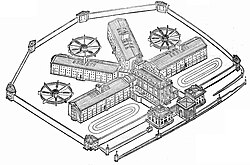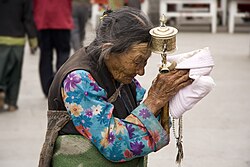Activity theory (AT; Russian: Теория деятельности) is an umbrella term for a line of eclectic social-sciences theories and research with its roots in the...
39 KB (5,189 words) - 21:37, 26 April 2025
The activity theory of aging, also known as the implicit theory of aging, normal theory of aging, and lay theory of aging, proposes that aging occurs with...
10 KB (1,192 words) - 03:35, 26 May 2025
Routine activity theory is a sub-field of crime opportunity theory that focuses on situations of crimes. It was first proposed by Marcus Felson and Lawrence...
16 KB (1,993 words) - 15:38, 22 December 2024
Internet theory is a conspiracy theory that asserts, due to a coordinated and intentional effort, the Internet now consists mainly of bot activity and automatically...
39 KB (3,595 words) - 05:33, 2 June 2025
from Intensify Cultural activities, activities referred to culture. Activity theory, a learning theory in education Social activity (disambiguation), several...
1 KB (205 words) - 05:17, 26 May 2025
Cultural-historical activity theory (CHAT) is a theoretical framework to conceptualize and analyse the relationship between cognition (what people think...
72 KB (7,700 words) - 05:28, 2 June 2025
Criminology (redirect from Criminal theory)
activity theory is used to examine all low-level street crimes such as theft. Much of the crime in rural areas is explained through routine activity theory...
67 KB (8,246 words) - 08:26, 25 May 2025
routine activity theory which focuses on the characteristics of crime rather than the characteristics of the offender. This is one of the main theories of...
18 KB (2,205 words) - 18:45, 25 October 2024
of places and times; investigators may invoke routine activity theory and rational choice theory in relation to the location of crimes. Crime patterns...
7 KB (750 words) - 02:11, 23 January 2025
In the framework of the Cultural-Historical Activity Theory (CHAT) the leading activity is the activity, or cooperative human action, which plays the...
31 KB (4,588 words) - 04:40, 2 May 2025
The continuity theory of normal aging states that older adults will usually maintain the same activities, behaviors, relationships as they did in their...
7 KB (745 words) - 20:02, 2 April 2025
Lev Vygotsky (section Cultural-historical theory)
in children and creating the framework known as cultural-historical activity theory. After his early death, his books and research were banned in the Soviet...
40 KB (4,873 words) - 19:17, 1 June 2025
sociological theories of social action, such as the action theory established by Talcott Parsons. Nor should it be confused with activity theory. Basic action...
6 KB (760 words) - 03:17, 22 March 2025
Genre studies (redirect from Genre theory)
within activity systems is closely related to Activity Theory, in which the interactions of different spheres of activity are examined. Activity theory, according...
75 KB (10,895 words) - 07:24, 18 March 2025
criminal activity. Geographic locations, urban or rural environments, and community infrastructure can all influence how routine activity theory applies...
23 KB (2,644 words) - 18:26, 26 May 2025
Gerontology (section Activity theory)
and women as they age. Activity theory was developed and elaborated by Cavan, Havighurst, and Albrecht. According to this theory, older adults' self-concept...
33 KB (3,909 words) - 15:45, 28 May 2025
emphasis on the activities that a user would perform with a given piece of technology. ACD has its theoretical underpinnings in activity theory, from which...
2 KB (212 words) - 05:24, 12 April 2024
as opposed to wrapping user experience around a finished framework. Activity theory: utilized in HCI to characterize and consider the setting where human...
50 KB (5,763 words) - 19:11, 29 May 2025
two major psychosocial theories are the activity theory and the continuity theory, and the disengagement theory comes to odds with both. Cumming and Henry...
6 KB (748 words) - 12:06, 11 April 2022
people also engage in sexual activity for reasons associated with self-determination theory. The self-determination theory can be applied to a sexual relationship...
73 KB (8,011 words) - 15:15, 26 May 2025
Technology: Activity Theory and Interaction Design (2009) and Activity Theory in HCI: Fundamentals and Reflections (2012). These works discuss activity theory and...
10 KB (1,000 words) - 14:15, 5 December 2024
Connectivism (redirect from Connectivism (learning theory))
zone of proximal development (ZPD) and Engeström's activity theory. The phrase "a learning theory for the digital age" indicates the emphasis that connectivism...
17 KB (1,917 words) - 23:46, 20 November 2024
Russian developmental psychologist and philosopher and a founder of activity theory. He was born and died in Moscow. Aleksei Leontiev's life was closely...
8 KB (778 words) - 12:21, 31 March 2025
to the theory crime happens when the activity space of a victim or target intersects with the activity space of an offender. A person's activity space...
9 KB (1,295 words) - 08:23, 23 February 2024
Actor–network theory (ANT) is a theoretical and methodological approach to social theory where everything in the social and natural worlds exists in constantly...
53 KB (6,579 words) - 23:44, 22 May 2025
whether, as activity theory implies, greater social activity is linked with well-being in adulthood. Selectivity theory mediates between the activity and disengagement...
40 KB (5,150 words) - 19:31, 17 October 2024
Ukrainian-American psychologist, was the founder of the Systemic-Structural Activity Theory (SSAT). He developed the qualitative and quantitative methods of the...
4 KB (460 words) - 20:45, 15 April 2025
Appropriation of knowledge (section Activity theory)
Appropriation in education is often understood and analyzed through activity theory. This theory was developed by Aleksei N. Leontiev and focuses on understanding...
9 KB (1,180 words) - 08:42, 1 April 2025
Organization (section Theories)
coordination) and loss of interaction. Among the theories that are or have been influential are: Activity theory is the major theoretical influence, acknowledged...
25 KB (2,969 words) - 04:23, 28 May 2025
Spoon theory is a metaphor describing the amount of physical or mental energy that a person has available for daily activities and tasks, and how it can...
11 KB (1,118 words) - 20:42, 30 April 2025











